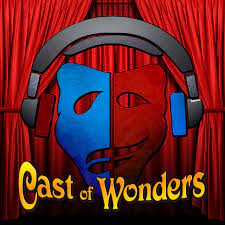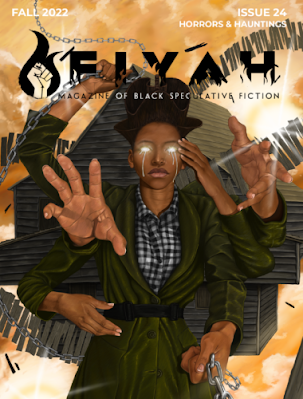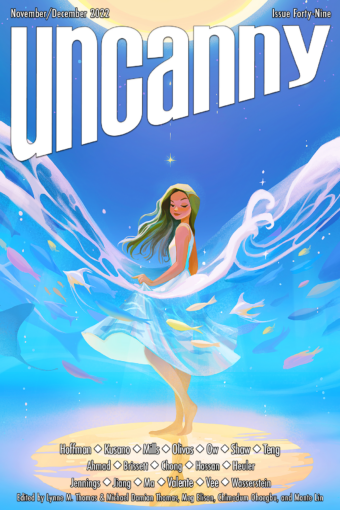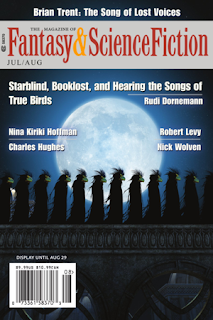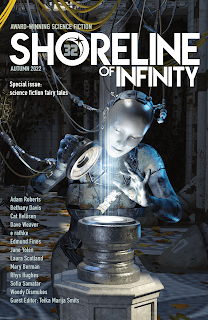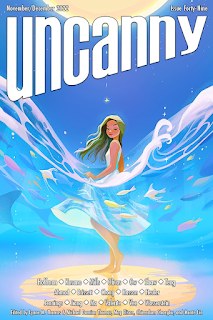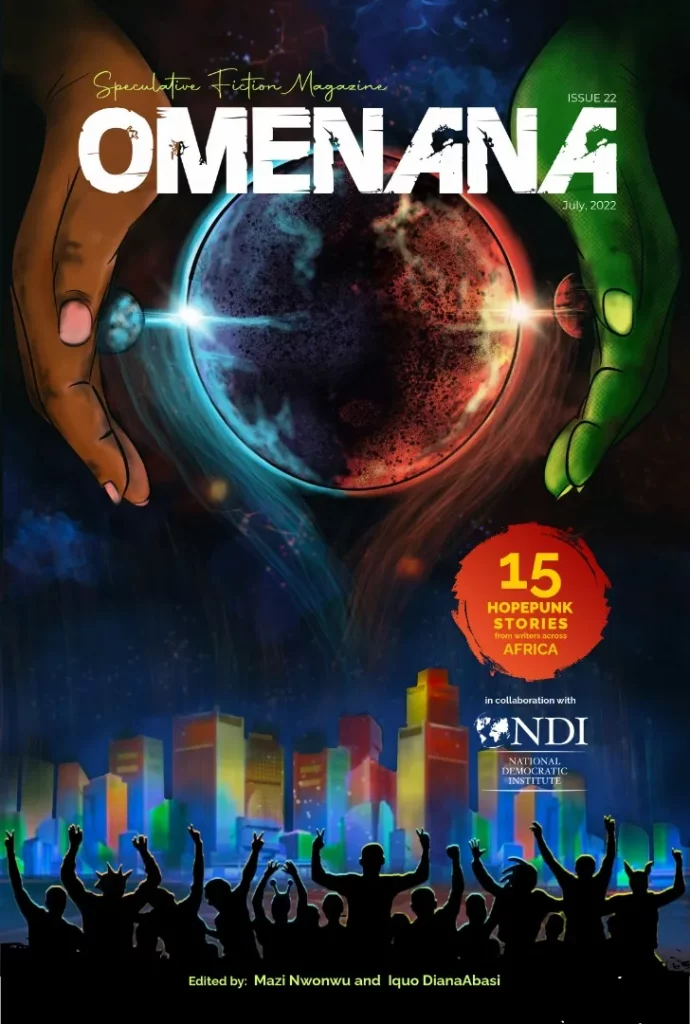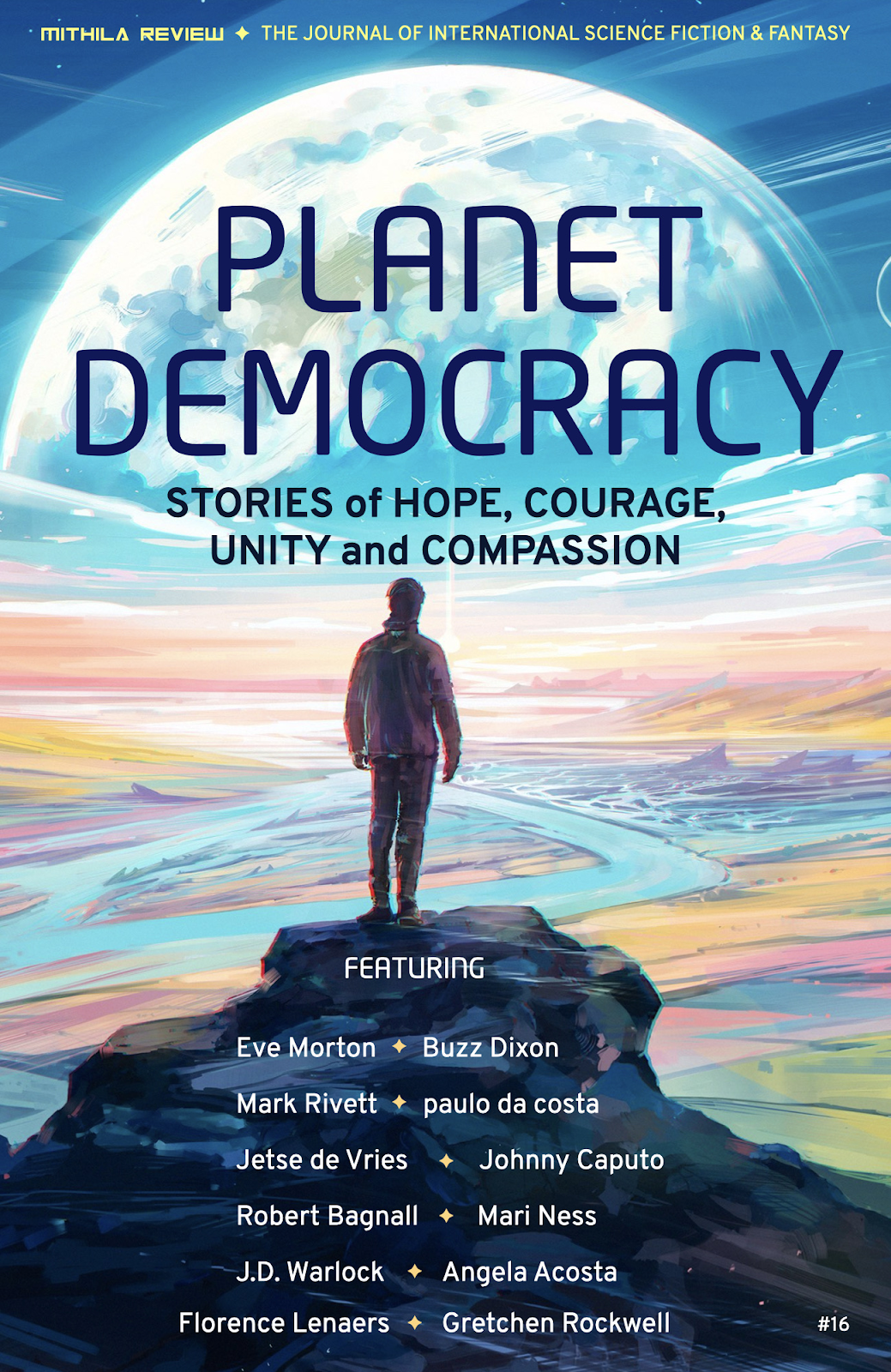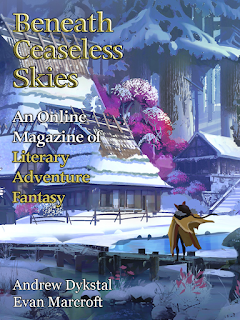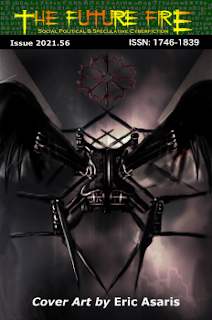Escape Artists October - December 2022
I'm not a big audio listener, but since Escape Artists have started offering review e-books of the original fiction from the network's five audio fiction podcasts (Escape Pod, Podcastle, Pseudopod, Cast of Wonders and Catscast) I've been making the effort to both read and listen to stories, sometimes at the same time. For those just tuning in, I have two PSAs. First, these podcasts do a great mixture of both original and reprint fiction ("reprint" here usually meaning these are still the first audio versions of the stories), so unless you are specifically reading for awards consideration I don't recommend limiting yourself to their original fiction only. Serial audio versions of stories like Meg Elison's "The Pill" (on Escape Pod) and Caroline M. Yoachim's "Colours of the Immortal Palette" (Podcastle) are particularly worth your time.
Second, even if you're a mostly adult fiction reader, do not sleep on Cast of Wonders. This YA zine publishes some seriously powerful original stories covering the gamut of speculative fiction. Beverly Aarons' "Gone Red" (Episode 513) is a strong piece of dystopian fiction, taking what might in other hands have been a dated premise (city districts assigned colours based on inhabitants' moods, used by a universal surveillance algorithm to distribute resources) and using it to tell a timely story about how societies blame and dehumanise the poor for their own impoverishment. "A Full Set of Specials" by Marguerite Sheffer (Episode 512) tackles a similar subject from a very different angle, telling the story of a nail salon where a down-on-her-luck customer is given a free magical manicure, lifting her up just enough to allow her to break the cycles holding her back. And "The Cat of Lin Villa" by Megan Chee (516) is a delightful story about a cat who wants to hang out with their friends and also wants their friends to be happy - one of those being much more difficult than the other.Elsewhere in the Escaposphere, you'll want to check out "A Shoreline of Oil And Infinity" by Renan Bernado (Escape Pod 863) for a story of separated siblings on a future polluted shore and "The Bone Pickers" by Kelsey Hutton (PodCastle 761) for an utterly grief infused tale of two indigenous women surviving in the wreckage of colonisation and environmental collapse. As a horror zine, you'd expect Pseudopod to deliver on its Halloween offerings and it totally does: there's "Trickin'" by Nicole Givens Kurtz (Pseudopod 835), which revels in the monstrous joy of its protagonist on Halloween night, and Alasdair Stuart's "The 2022 Halloween Parade" (Pseudopod 836), full of figures you won't recognise but who will nevertheless feel strangely, eerily familiar. Go forth and treat your ears!
FIYAH Issue 24: Horrors & Hauntings
Continuing the belated Halloween Theme (it's nearly October!), FIYAH's 24th issue is long and it is good. "Girl Eats Girl" by Gnesis Villar kicks off with an emotionally charged sort-of friendship by two Black latinx teen girls trying to survive both their white town and the creatures living in the forest - which seem intent on changing at least one of them. Eden Royce is always a great name to see in a table of contents, and "Sugar Honey Iced Tea" is a fantastically creepy story about coming into work on a Saturday because the mediocre man who got promoted above you hasn't done his job properly. "Old Solomon's Eyes" features two plucky youths trying to negotiate with a demon who has taken up residence near their village, as the adults around them attempt less successful methods to deal with it. I love how this story plays with the morality of its characters, making both the inaction and the overreactions from various segments of the community seem damaging and the demon's perspective seem nearly sympathetic, while also coming down firmly on the side of "negotiating with demons is terrifying and tricky".
The final three stories all deal with family trauma in some way, like Tobi Ogirundan's story of two brothers and a terrifying childhood incident "In The Smile Place". "Chrysalis" by Aimee Campbell features a young person trying to break free of a family curse which has transformed their home into the lair of a spiderlike creature who claims each member of their family as its own as they come of age. The horror here is claustrophobic and visceral, and it pairs compellingly with "Blooms of Sorrow" by Amanda Helms, in which a family garden becomes a hungry burial ground for all kinds of familial pain, from an abusive former husband to a daughter's struggle with untreated endometriosis. Both of these final stories offer some level of catharsis to their protagonists, which stops them from tipping over into pure hopelessness - so it's not all creepy doom and gloom. Read your FIYAH subscriptions, everyone.
Strange Horizons
I tend to read Strange Horizons fiction in no particular order, all at once, so the following are going to be from all over their 2022 publication list, but let's try some thematic association for this recommendation journey:
 |
| Artwork for "Intimacies" by Dominique Ramsey |
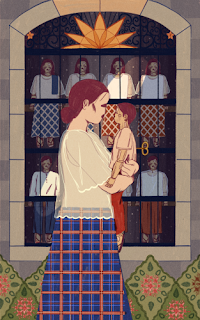 |
| Artwork for "Clockwork Bayani" (SEA special issue) by Gianne Encarnacion |
When you're finished crying from that depiction of matrilineal trauma, treat yourself to "Mother Hunger" by Mary Maxfield, which starts with a somewhat whimsical premise where daughters are assigned their mothers as teenagers and need to care for them until they get mothers of their own, and turns it into one long gut-wrench of a story about failures of care and community for a daughterless woman whose mother takes absolutely everything she can provide and more. After that, you'll probably be both hungry and in need of some lighter storytelling, so it'll be time to slip into the Southeast Asian issue with "Wok Hei St" by Guan Un, a heist where the steak could not be higher (because you're tossing it! in your wok! ...I'll get me coat). Stay in Southeast Asia to read... well, read all of it, but for the purposes of this recommendation journey, go with "Lay My Stomach On Your Scales" by Wen-yi Lee, with its story of teenage body awkwardness featuring a manananggal and the girl who has stolen her hands. Finally, finish off with another heartwarming spooky tale with "Embroidery of a Bird's Heart" by Nelly Geraldine García-Rosas, about a daughter whose ghostly grandmother comes over for lunch and guides her through a change of her own.
Questing Elsewhere
I'm tired of difficult stories about reproductive justice, because I'm tired of how much they hurt and how we still need them so badly. "Rabbit Test" by Samantha Mills (Uncanny Magazine Issue 49) hurts, and is badly needed, featuring the cyclical struggle for control over women's bodies with a focus on a future where intrusive surveillance is the norm. Make time for it.While you're following the Strange Horizons recommendation trail above, you could take a left turn at Wok Hei St and go instead to Giganotosaurus' "Begging the Moon" by Eli Brown, the story of a woman sourcing ingredients for tom yam gung nam for a gang lord's birthday in a border city full of refugees and cut off from surrounding countries. It's thematically powerful, and making food the central driver adds a little touch of levity while bringing the city of Diyu to life.
Finally, I don't normally talk about the to-read pile in this column but two recent acquisitions demand to be mentioned. First, We're Here: The Best Queer Speculative Fiction 2021 (edited by Charles Payseur and L.D. Lewis) has a table of contents that easily lives up to its 2020 predecessor; starting with "The Captain and the Quartermaster", an outstanding and heartbreaking tale by 2020 co-editor C.L. Clark, is a great touch. Second, Song of the Mango and Other New Myths by Vida Cruz-Borja has a beautiful cover and a whole lot of stories I'm excited to dive into, alongside some of my existing favourites by the author (like the titular "Song of the Mango", which previously appeared in the "Beyond the Line of Tree" chapbook.
Will 2023 be a year of returning to more regular columns? I hope so! For now, happy reading and I'll see you when Hugo nominations open.

